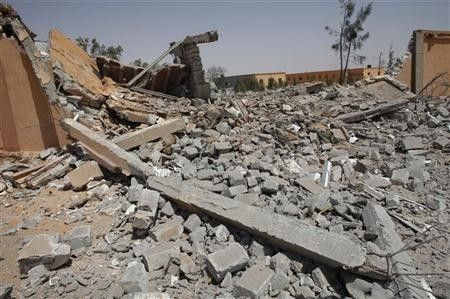Tripoli says NATO strike kills dozens of civilians

Libyan officials said on Tuesday dozens of civilians had been killed in a NATO strike on a cluster of farmhouses east of Tripoli, but the alliance said it hit a legitimate military target.
A strike causing large numbers of civilian casualties could undermine support in some NATO nations for a campaign to oust Libyan leader Muammar Gaddafi that has already proved much longer, bloodier and more costly than its backers had anticipated.
A spokesman for Gaddafi's government, who took foreign reporters to the scene of the strike, said 85 people had been killed when missiles struck farm compounds in the village of Majar, about 150 kilometers (90 miles) east of Tripoli.
He said the dead included 33 children, 32 women and 20 men.
"They (NATO) do not differentiate between soldiers, children and old people," said Abdulkader Al-Hawali, a fifth-year medical student at the hospital in nearby Zlitan where officials said some of the dead and wounded were taken.
Gaddafi's government declared three days of mourning for the victims, according to state television.
This correspondent, taken to the hospital in Zlitan by Libyan government officials, counted 20 body bags in one room, some of them stacked one on top of the other.
Medical workers opened some of the body bags. One contained the body of a child who appeared to be about two years old. Another had inside the remains of a child.
In total, reporters saw about 30 bodies at the Zlitan hospital. Officials said the rest of the people killed in the air strike had been taken to other hospitals, but Reuters was unable to verify that information independently.
NATO TARGET
At a news conference in Brussels, a NATO military spokesman said the target of the strikes was a military staging area which was being used to support government attacks on civilians.
"This was a legitimate target and by striking it NATO has reduced the pro-Gaddafi forces' ability to threaten and attack civilians," Colonel Roland Lavoie told a regular briefing.
"We do not have evidence of civilian casualties at this stage, although casualties among military personnel, including mercenaries, are very likely due to the nature of the target."
NATO forces have been mounting regular attacks, from both sea and air, on targets around Zlitan, where the alliance says government forces are killing and persecuting civilians who are trying to end his 41-year rule.
Gaddafi has denied attacking civilians, and says the NATO bombing campaign is an act of colonial aggression aimed at stealing Libya's plentiful oil.
Libya's conflict -- the bloodiest of the "Arab Spring" uprisings convulsing the region -- began in February when thousands of people protested against Gaddafi.
Western powers say the Libyan leader must relinquish power but despite months of pounding by NATO bombs, defections from his inner circle and international sanctions, Gaddafi is showing no signs of wanting to quit.
REBEL RESHUFFLE
His rebel opponents, meanwhile, are struggling to advance towards Tripoli and their administration in the eastern city of Benghazi was rocked by the assassination last month of the rebel military chief.
Mustafa Abdel Jalil, leader of the rebel National Transitional Council, dismissed the council's executive arm late on Monday in what analysts said was an effort to restore the opposition's credibility.
If confirmed, the casualties in the village of Majar would not be the first time that NATO activity in Libya has resulted in civilian deaths.
In June, NATO admitted it destroyed a house in Tripoli in which Libyan officials said nine civilians were killed. The alliance blamed a missile malfunction.
Shortly afterwards, the Libyan government reported almost 20 people were killed in a strike on the home of a member of Libya's 12-strong Revolutionary Command Council, led by Gaddafi.
Libyan officials say hundreds of civilians have been killed since the NATO bombing campaign began. But in most cases they have not supplied firm proof while in some instances the evidence provided has been contradictory.
© Copyright Thomson Reuters 2024. All rights reserved.





















